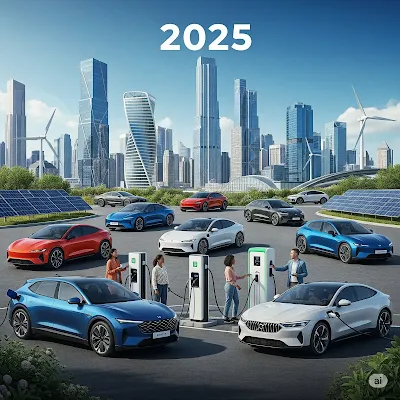As federal tax incentives continue to make electric vehicles more accessible and charging infrastructure expands rapidly across the nation, 2025 marks the year when EVs truly go mainstream. Major automakers have invested billions in electric technology, resulting in vehicles that offer impressive range, faster charging, and competitive pricing with traditional gasoline cars.
Tesla Continues to Lead the Pack
Tesla remains the dominant force in America's EV market, with significant updates to their core lineup. The 2025 Tesla Model 3 starts at $44,130 and features improved ride comfort, ventilated front seats, and enhanced range capabilities. The Model 3 Long Range variant offers exceptional value with over 350 miles of EPA-estimated range, making it perfect for both daily commuting and long-distance travel.
The Model Y continues its reign as America's best-selling electric SUV, with pricing starting around $47,000 for the rear-wheel-drive version. Tesla's Supercharger network advantage remains significant, with over 50,000 charging points nationwide providing peace of mind for long-distance travelers.
For luxury buyers, the 2025 Tesla Model S delivers supercar performance with a starting price of $81,630. The flagship sedan offers an impressive 402-mile range and acceleration that rivals the world's fastest sports cars, proving that electric doesn't mean compromising on performance.
Traditional Automakers Step Up Their Game
General Motors has made significant strides with their Ultium platform, powering vehicles like the 2025 Chevrolet Equinox EV. This compact SUV offers competitive pricing and practical range, making electric mobility accessible to mainstream American families. The Equinox EV represents GM's commitment to offering affordable electric transportation without sacrificing quality or features.
Cadillac's luxury approach shines through the 2025 OPTIQ, a premium electric SUV featuring a curved 33-inch LED display and over 300 miles of range. This five-passenger SUV showcases how traditional luxury brands are embracing electrification while maintaining their premium positioning.
Ford continues building on the success of their F-150 Lightning and Mustang Mach-E with expanded electric offerings. Their commitment to American manufacturing and robust charging infrastructure partnerships make Ford EVs particularly appealing to domestic buyers.
European Excellence Arrives in America
The 2025 Audi A6 e-tron brings sophisticated German engineering to American roads. With three powertrain options ranging from 362 to 543 horsepower, the A6 e-tron offers luxury buyers multiple performance levels. The high-performance S6 e-tron variant accelerates from 0-60 mph in just 3.7 seconds, demonstrating that electric luxury cars can deliver thrilling performance.
Hyundai's Ioniq lineup continues to impress critics and consumers alike. The 2025 Hyundai Ioniq 6 has earned recognition as one of the best electric cars available, combining sleek design, impressive efficiency, and competitive pricing. Hyundai's commitment to fast-charging technology means shorter stops during long trips.
Luxury Electric Vehicles Reach New Heights
The 2025 Lucid Air sets new standards for luxury electric sedans with a perfect 9.3 out of 10 rating from automotive experts. This California-built sedan offers over 500 miles of range in certain configurations, addressing range anxiety for even the most demanding drivers. Lucid's attention to interior space and luxury details rivals traditional premium brands like Mercedes-Benz and BMW.
Polestar prepares to launch the Polestar 5, their flagship electric sedan with over 800 horsepower. This Swedish-designed vehicle promises to compete directly with Tesla's Model S while offering a more traditional luxury car experience with premium materials and refined driving dynamics.
Charging Infrastructure Supports EV Growth
The success of the 2025 EV models lineup depends heavily on charging infrastructure, and America has made remarkable progress. The adoption of Tesla's NACS (North American Charging Standard) by major automakers means that new EVs will have access to the most extensive fast-charging network in the country.
Federal investments in charging infrastructure, combined with private sector expansion, mean that range anxiety is becoming a thing of the past. Most 2025 EV models offer enough range for typical daily driving, while fast-charging capabilities enable quick top-ups during longer journeys.
Affordability Meets Innovation
One of the most significant developments in the 2025 EV market is the availability of affordable options that don't compromise on features. The Nissan LEAF continues to offer one of the most budget-friendly entry points into electric driving, while vehicles like the Chevrolet Equinox EV prove that mainstream pricing is achievable without sacrificing quality.
Federal tax credits of up to $7,500, combined with state and local incentives, make many 2025 EV models cost-competitive with comparable gasoline vehicles. When factoring in lower operating costs and reduced maintenance requirements, electric vehicles often provide better long-term value.
The Future is Electric
The 2025 EV models lineup USA represents more than just new car choices—it signals a fundamental shift in American transportation. With improved technology, expanded charging networks, and competitive pricing, electric vehicles are no longer a niche choice for early adopters.
From practical family SUVs to high-performance luxury sedans, the 2025 model year offers electric options for virtually every need and budget. As battery technology continues improving and production scales increase, we can expect even more compelling choices in the years ahead.
For American consumers considering their next vehicle purchase, 2025 presents an unprecedented opportunity to embrace electric mobility without compromising on performance, features, or value. The electric revolution isn't coming—it's already here, and the 2025 model year proves that the future of American transportation is definitively electric.
Making the Right Choice for Your Needs
When evaluating the 2025 EV models lineup, consider your driving patterns, budget, and feature priorities. Daily commuters might prioritize efficiency and charging convenience, while families may focus on space and safety features. Performance enthusiasts can find electric vehicles that exceed the capabilities of traditional sports cars.
The key is understanding that today's electric vehicles offer solutions for real-world driving needs while providing environmental benefits and often superior ownership experiences compared to traditional vehicles. The 2025 model year marks the point where electric vehicles transition from alternative choices to mainstream options that simply make sense for most American drivers.






No comments
Post a Comment